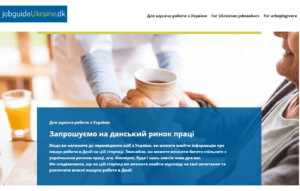News
Website launched to help Ukrainians find work in Denmark
This article is more than 3 years old.
JobguideUkraine.dk has been established in order to assist refugee job seekers, as well as prospective employers

Helping bridge the job gap (photo: jobguideukraine.dk)
With the government expecting over 100,000 Ukrainian refugees to come to Denmark as a result of the Russian invasion, one of its priorities is finding jobs for those arriving.
Earlier today, the new webpage JobguideUkraine.dk was launched in a bid to address that issue.
Established by ‘Partnerskab om ukrainere i job’ (‘Partnership for jobs for Ukrainians’), the site will assist Ukrainian job seekers, as well as prospective employers.
“Persons displaced from Ukraine can find information on this website about the job-seeking process in Denmark. You will find a lot of similarities between the Danish and Ukrainian labour market, but certain aspects will likely be unfamiliar to you,” is written on the website.
“We hope that this page answers your questions and gets you off to a good start with finding employment in Denmark.”
READ ALSO: Municipalities desperate for Ukrainian interpreters
Expressway to jobs
‘Partnerskab om ukrainere i job’ is a joint co-operation between the government, labour market players, the Regions and municipalities.
Aside from being updated with links to job sites and other guideline material, it also allows users to create CVs and provides an introduction to wage and labour market conditions in Denmark.
There is also an area where potential employers can alert the site to vacant positions that could suit the refugees. You can find that here.
“The government is focussed on the Ukrainian refugees being properly welcomed and receive the help and secure framework they require,” said employment minister, Peter Hummelgaard.
“But we also hear that many of the Ukrainians want to work and contribute. So we’ve made a special law and set up the partnership to make it possible for them to enter the labour market as quickly as possible.”
JobguideUkraine.dk offers language options in Ukrainian and English – and Danish for the employer page (see front page image above).










































